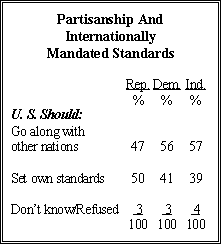Introduction and Summary

Most Americans are willing to join other countries in setting standards to improve the global environment and a majority would even pay more for gasoline to reduce global warming. But on the eve of the December Kyoto conference on climate change, the American public strongly rejects the notion that the United States should bear more of the burden of repairing the environment than poorer countries, even when the consideration that these nations have not caused as much damage as the U.S. is raised.
These are the principal findings of a new Pew nationwide phone survey of 1,200 respondents which shows support for dealing with global warming through international efforts is linked more to personal environmentalism than to increased fears about the global environment. In fact, fewer people are greatly concerned about the greenhouse effect now than in Gallup polls taken in 1989 and 1990. The Pew survey conducted last week shows global warming ranking well below other environmental dangers on the public’s alarm list.
Only a quarter of the public today says they worry a great deal about global warming or the greenhouse effect — down from 30% in a 1990 Gallup survey. Larger percentages report concern about pollution of lakes, rivers and reservoirs (61%), toxic waste contamination (59%) and air pollution (47%). However, all of these measures reflect lower levels of concern than observed in Gallup polls in 1989 and 1990.
Nonetheless, environmental groups have considerable credibility with the public today. More Americans have confidence in these groups to strike the right balance between protecting the environment and keeping the economy healthy than in either business or labor (66% vs. 42% and 38%, respectively). President Clinton is also given a somewhat greater vote of confidence in this regard (61%) than either Democrats (57%) or Republicans (55%) on Capitol Hill.
Surprisingly strong public support is found for higher gasoline prices to help reduce global warming. In one half of Pew’s sample, 73% of respondents said they would be willing to pay five cents more per gallon for gas. A narrower 60% margin of acceptance was found when a 25 cent per gallon price hike was tested with the other half sample.
The new Pew survey also indicates that most Americans regularly take some pro-environment action — such as recycling, lowering thermostats to conserve energy or trying to purchase recycled products. This personal involvement is strongly related to support for higher gasoline prices and internationally mandated environmental standards. Those who are most active in this regard are also more supportive of international standard setting (58%) and are more inclined to pay as much as 25 cents extra per gallon (67%) than are those who do little or nothing (47% and 52%, respectively).

But, concern about American sovereignty may be more of an obstacle to international efforts to curtail global warming than higher gasoline prices. Americans say the United States should join other nations in setting global environmental standards rather than establishing its own standards by 55% to 42%, a far smaller majority than supports increased prices at the pump.
Gender and politics have a direct bearing on public attitudes on the environment. More women than men are willing to accept higher gasoline taxes to reduce global warming. Gender is more related to this pocketbook question than family income or education.
Republicans and Democrats split on the issue of the United States joining other nations to establish global environmental standards. A 50% to 47% majority who self-identify with the GOP oppose such a step, while a strong 56% to 41% majority of Democrats are in favor. The poll also finds that opponents of another international agreement, NAFTA, are cool to international environmental standard setting.
Republicans, Democrats and Independents alike think all countries rich or poor should now share equally in global clean-up efforts. Fully 70% of of Pew’s respondents felt this way, compared to just 19% who believed that poorer countries should be allowed to do less. Even Americans who are aware of the fact that the United States produces more carbon dioxide per capita than other countries believe that the U.S. should not bear more of the burden.
The poll suggests that there may be considerable potential for opinion change on these issues since the public has yet to fully engage in the debate. While most Americans can correctly identify the greenhouse effect, few have paid “very close” (9%) or even “fairly close” attention (24%) to news about U.S. policy on global warming. The lack of public focus is also evidenced by the fact that just 1% cite the environment as the most important problem facing the country. The poll finds that those who worry about global warming are more attentive to news about the policy debate surrounding it than those with less concern.
Opponents of a gasoline price increase and internationally mandated standards may also take some comfort in the findings of Pew longitudinal surveys that reveal declines since 1992 in strong support for environmental regulation. This drop is consistent with less alarm about a range of environmental issues compared to the early 1990’s.




